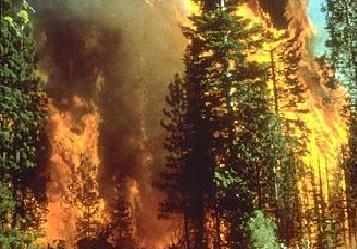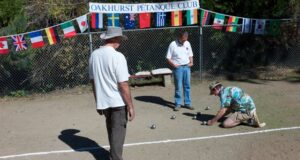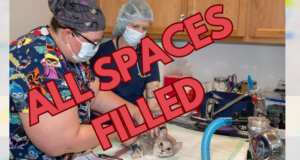The California Senate Budget Committee has approved the request by the Board of Equalization (BOE) to create 57 new two-year positions at a cost of some $6.4 million, to bill and collect the State Responsibility Area (SRA) fee, otherwise known as the “rural fire fee,” imposed by AB 29X.
At the latest in a series of Town Hall Meetings hosted by Tom Wheeler, District 5 Supervisor, the rural fire fee was the hot topic of the evening.
This $150 fee was part of the 2011-2012 state budget meant to raise some $84 million to offset costs to the California Department of Forestry and Fire Protection, and it has been met with strong opposition.
The fee would apply to SRA’s, which are designated lands where the financial responsibility for preventing and suppressing fires falls to the state, rather than local or federal agencies. SRA’s include more than 31 million acres of land in every county in the state except San Francisco and Sutter counties.
Property owners who are located within the boundaries of a local agency that already provides fire protection services would have their fee reduced from $150 to $115. This fee would apply to some 13,727 properties in Madera County and over 800,000 across the state.
This has been a very contentious issue, as the money goes directly into the general fund, not to service the residents of the area from which the taxes are collected. There is no guarantee that any of this money will come back to Madera County, and though Governor Brown says that the fee is necessary to pay for fire services as more residents move into rural areas, this money will not be used to fight fires.
According to a memo issued by the California Board of Forestry and Fire Protection’s Resource Protection Committee, “It is necessary to impose a fire prevention fee to pay for fire prevention activities in the SRA’s that specifically benefit owners of structures in the SRA’s. This law addresses prevention. This is not a law that addresses protection (suppression) issues.”
That distinction may be fueling the debate, and was the subject of much discussion at the Town Hall meeting.
“We don’t get the money. They don’t get it either,” says Wheeler, indicating the Cal Fire contingent in the room. “This money goes into the general fund to be distributed however they see fit. It doesn’t just go to Cal Fire.”
David Irion, Cal Fire Division Chief, says, “Cal Fire has only about $1,000,000 ear-marked for fire prevention. Cal Fire is for suppression. There are a lot of unknowns with this fee. It’s not like we’re going to see more engines, more planes; if that were the case I don’t think people would object.”
Wheeler also addressed the notion that mountain area residents are responsible for wildfires, and should therefore being taxed to prevent them. “A large percentage of fires up here are caused by lightning, or by visitors who don’t understand the dangers, or even people driving through throwing cigarette butts out the window. We do our part because we live up here and certainly want to protect our homes.”
Property owners in the area are already required to take steps to prevent fires. Residents receive a mailer from Cal Fire requiring them to complete a Fire Prevention Checklist and comply with the basic requirements of the California PRC Code relating to wildland fire prevention. Those who do not return the Fire Hazard Abatement Check List will be inspected by Cal Fire personnel, and are subject to fines of up to $500.
Quoted in the Record Searchlight, California State Senator Doug LaMalfa (R – District 4) had this to say, “Many rural Californians already pay taxes for their local fire protection district, in addition to state taxes, so they won’t see any new service at all from this tax. Rural residents already are required to keep their homes fire safe, but the state government’s failure to safely maintain public lands directly contributes to the size of wildfires. Taxing Californians more won’t do a thing to change that.”
Said one local resident, “Many of our homes are in the mountains, surrounded by lands owned by the government – The Forest Service, the National Park Service, The BLM – and we have little or nothing to say as individual citizens about what is done for fire prevention in those hills, and yet this is our responsibility.”
But perhaps the main point of contention with the fee is the notion that it isn’t a fee, it’s a tax, and therefore should have required a two-thirds majority in the legislature. Opponents and many lawmakers say it amounts to an unconstitutional tax that was passed illegally.
“Most people say it’s a tax. They (the Legislature) say it’s a fee, so nobody gets to vote on it,” says Wheeler.
The fee has been roundly criticized by such groups as the California Cattlemen’s Association, the California Farm Bureau Federation, and county officials who, according to Wheeler, refused to bill for and collect the fee without being provided funds to do so.
“When this fee was first introduced, the state planned to have the counties bill property owners,” says Wheeler. “All 58 of the counties in California refused to do so without being compensated.”
So the BOE was assigned the task of billing for and collecting the fee. However, the agency lacked the personnel to handle the task, so a funding request was made to the Senate Budget Committee, and approved last week, in order to allow the BOE to hire additional staff. It is estimated that the BOE would only be able to bill about 4,000 parcel owners per month.
The state rural fire fee is also strongly opposed by the Howard Jarvis Taxpayers Association, which reportedly has their lawsuit prepared, and has threatened to sue as soon as the first bill is delivered.
Several California lawmakers have introduced legislation to repeal the fee, so far without success.




